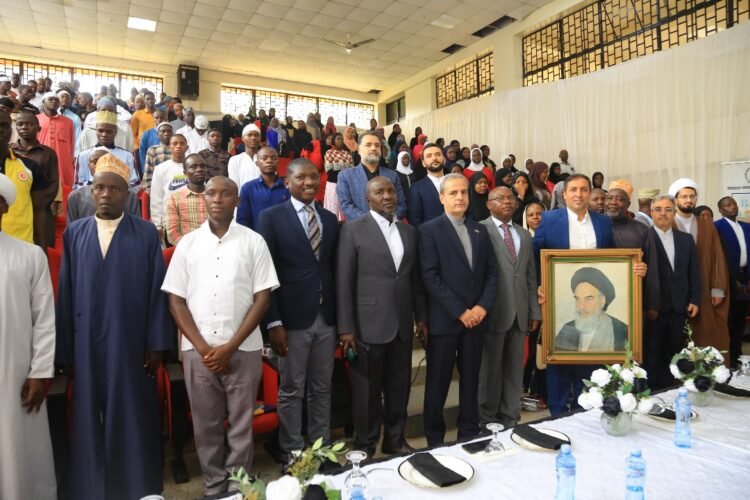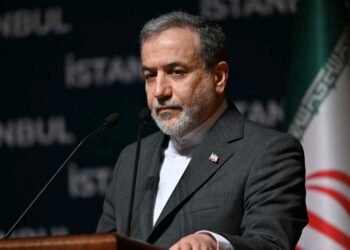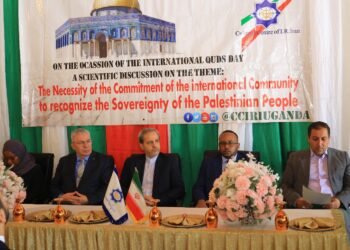Religious leaders, and scholars have gathered at Makerere University Business School to commemorate the 36th death anniversary of Imam Ruhollah Khomeini, the revolutionary leader and founder of the Islamic Republic of Iran.
The event, moderated by Hon. Issah Katungulu Luyimbaazi, the African Youth Ambassador, brought together a remarkable array of guests, each carrying stories, perspectives, and insights about the influence and legacy of Imam Khomeini.
Among the honored attendees were His Excellency, the Deputy High Commissioner of the Kenya High Commission; Mr. Namuguzi from UNICEF-NPC and his delegates; Hon. Asuman Basalirwa, leader of the Parliamentary Muslim Caucus in Uganda; Dr. Rouhollah Dehghani, Principal of Al-Mustafa Islamic College; and Sheikh Muhammad Ali Waiswa, the Deputy Mufti of Uganda. The academic and religious spheres were well represented with speakers including Dr. Faridah Kyambadde from the Islamic University in Uganda (Females Campus), Dr. Ahmed Walugembe, Head of Marketing and Media Studies at MUBS, and Dr. Celestine Katongole, Head of the Tourism Department at MUBS, among others.
Institutions such as Excel Vocational Training Centre, Metropolitan International University, Markazi Imam Reza in Kiteezi, Swadiq Centre in Luwafu, and the Islamic University in Uganda (Females Campus) joined MUBS students to pay tribute and engage in deep cultural and academic exchanges.

The event opened with a heartfelt prayer from Sheikh Buye Hussein, a teacher from Imam Reza School. Soon after, Dr. Ahmed Walugembe delivered a welcome message on behalf of the MUBS Principal, Dr. Muhwezi, emphasizing the school’s appreciation for its ongoing collaboration with the Iranian Embassy. He highlighted the pivotal role Imam Khomeini played in forging strong ties with African nations, particularly in education and health relationships that continue to transform lives.
Dr. Walugembe applauded the commitment of Sheikh Muhammad Ali Waiswa in strengthening Uganda’s education sector and recognized Dr. Celestine Katongole, who had recently visited Iran alongside fellow Ugandan academicians. Dr. Katongole shared his observations from that visit, noting the stark contrast between Western portrayals of Iran and the reality nation rich in culture, organization, and innovation, offering high-quality products and services at modest prices. He questioned why Ugandan traders were not yet engaging more with Iran in business.
Another voice from MUBS, Dr. Owen Kembabazi, reflected on her participation in the International Women’s Congress at Al-Zahra University in Iran. She shared her experiences discussing women’s issues on a global platform and urged Ugandans to seek accurate information about Iran, beyond propaganda, calling for expanded academic and cultural exchanges.
Dr. Assadi, a lecturer from Al-Mustafa Islamic College, offered a scholarly perspective on Imam Khomeini’s contributions, quoting Quranic verses to emphasize the responsibility scholars hold in continuing the work of the prophets particularly in resisting tyranny and oppression. He described Imam Khomeini as a multifaceted intellect, whose legacy included championing Islamic unity and spearheading a cultural revolution that continues to resonate.

Sheikh Muhammad Ali Waiswa took the podium to echo these sentiments. He reminded the audience that commemorating Imam Khomeini was not just about remembering a man, but about recommitting to values of justice, knowledge, and resistance to exploitation. He noted Iran’s unmatched support for Palestine amid ongoing aggression, and its exceptional progress in science, technology, and education — achievements made possible by Khomeini’s vision.
Hon. Asuman Basalirwa then spoke, bringing a personal tone to the commemoration. As both a religious and political leader, he attributed much of his journey to principles rooted in Islamic leadership, simplicity, servant leadership, and community transformation. He lauded Iran’s infrastructural success despite economic sanctions and called on fellow Africans to resist misleading narratives.
Mr. Abdollah Abbasi, the Iranian Cultural Counsellor, reminded attendees of Imam Khomeini’s enduring presence in the hearts of believers and thinkers alike. He highlighted Khomeini’s role in drafting Iran’s constitution and his declaration of Quds Day, a lasting call for solidarity with oppressed nations.
Closing the event with a powerful address was H.E. Mr. Majid Saffar, Ambassador of the Islamic Republic of Iran. He described Imam Khomeini as a voice for the voiceless, a defender of peace, and an architect of a governance model based on Quranic principles. The ambassador denounced Israel’s actions in Palestine, echoing Khomeini’s firm stance against injustice and reminding attendees that Iran remains committed to sharing its scientific and technological advancements with the Global South.


























